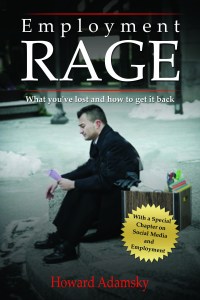 I thoroughly enjoyed reading Employment Rage. The author shares first hand experiences and personal perspective on the trials and tribulations one goes through when they wake up one morning and find themselves unemployed. But not only does the author speak to how it felt to him personally, he successfully crafts cogent pieces of advice for you the reader. This book can be read sequentially or dig directly into a specific chapter, you will find value in either approach. I read it in the normal sequential manner, and found myself grabbing bits and pieces from the manuscript which drove home salient points to me, the reader.
I thoroughly enjoyed reading Employment Rage. The author shares first hand experiences and personal perspective on the trials and tribulations one goes through when they wake up one morning and find themselves unemployed. But not only does the author speak to how it felt to him personally, he successfully crafts cogent pieces of advice for you the reader. This book can be read sequentially or dig directly into a specific chapter, you will find value in either approach. I read it in the normal sequential manner, and found myself grabbing bits and pieces from the manuscript which drove home salient points to me, the reader.

Let me share some of those with you:
Page 17: “What we cannot live without is hope. Living without hope is too much to bear.” Truer words have never been scribed.
Page 27: “New Orleans, unemployment in that city hit a peak of 11 percent. In Detroit, the unemployment rate is 28.9 percent. That’s worth spelling out: twenty-eight point nine percent.” These numbers are huge, and demonstrate that the national average of 9.8 percent in January 2011, is just that an average, but when it is you, its 100%.
Page 44: “Why hire a person who’s unemployed? That is twisted logic, but it’s real, and it’s out there.” This statement is completely counterintuitive and I am sure in some quarters absolutely true. The hiring manager or recruiter using this criterion is shorting not only themselves, but their company or client. The more important data point is, “Why is this person unemployed? For cause? A question to ask a prior employer, is this person eligible to be re-hired? The answer speaks volumes.
Page 49: “Society prospers when we spend twice as much time offering help than we spend asking for help.” And then page 64: “I advise you to develop the relationships before you need them.” Pay it forward. Pay it forward. Pay it forward. The author gets it.
Page 93: “I will find a better position, but they will not find a better employee.” You may read this quote and think it is mental gymnastics, but the reality is you must bring value to the table, as the author highlights throughout, you are your best advocate for projecting who you are and what impact you are capable of bringing to the table.
Page 133: The author quotes from a Rod Sterling short-story, They’re Tearing Down Tim Riley’s Bar when one character says to another “Why don’t we level with one another? I’m on the way down. You’re on the way up, and we’re just passing each other in midair. I’m looking at a threat and you’re looking at an obstacle.” Perhaps it is my New England stock, but this is a quote I heard from my parents when I was a young bullet-proof whippersnapper, with the admonishment added: Be kind to all, as you want them to wave on their way by you.
Page 151: The author reaches out and pulls from the book Me 2.0 Build a Powerful Brand to Achieve Career Success, by Dan Schwabble. Schwabble gets it: “Between current economic conditions and the technological evolution of the Internet, the traditional approach most job seekers have taken in the past is no longer viable. The approach—developing a resume and cover letter, locating jobs on and submitting your resume to corporate sites and job banks, and crossing your fingers in hopes of receiving a call from a hiring manager—is, for the most part, a thing of the past.”
Page 182: “The days of everyone looking a lot like you in the workplace are over. We are multicultural, multiethnic, and multiracial. One word captures the workplace of today: Globalization. With globalization the individual who brings personal bias and discriminatory views to the table, won’t find a seat at the table.
In sum, I would describe this Howard Adamsky’s, Employment Rage as one man’s guide on how to survive the economic downturn when it seems to literally have you by the throat. This is the book you read when you are gainfully employed or ensconced in education; this is the book you must read when you wake up one morning and find yourself unemployed
—
Christopher Burgess
(NB: A pre-publication proof of this book was provided to this writer)


